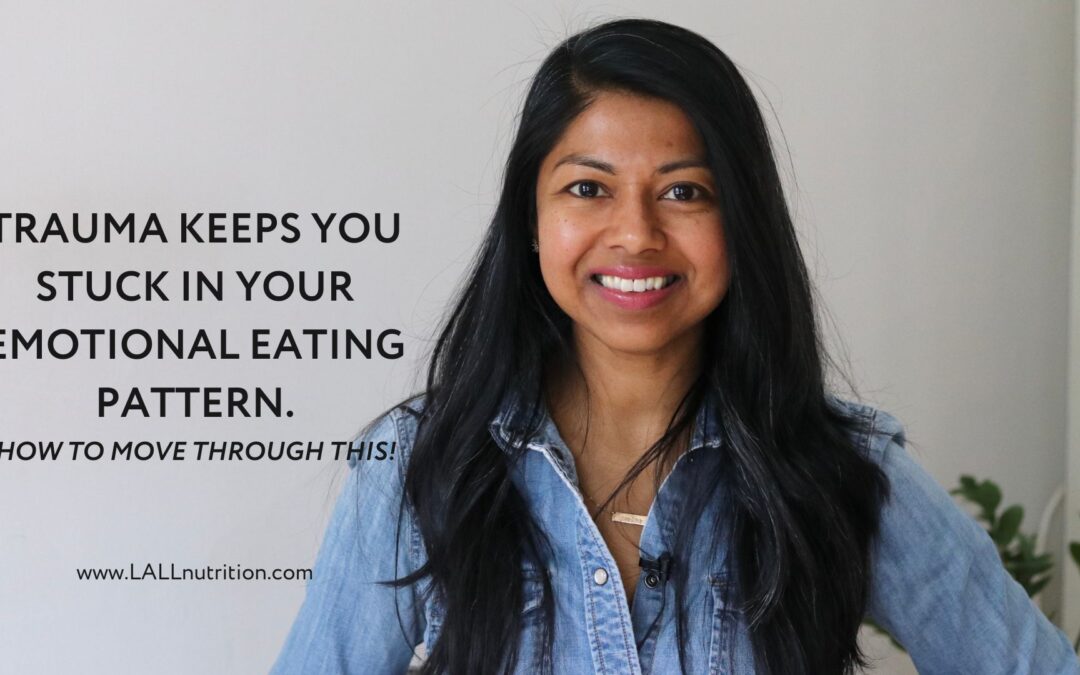Hello love,
Before I dive in I want you to not be afraid of the term trauma. Trauma means we experienced an event in our life and we were left unresolved from it.
That means the emotions associated with it are unprocessed, and how we felt about he situation just left us feeling that we couldn’t move forward.
This can be something small to something big. The pattern that I usually see with clients is that they experienced a lot of “little t” trauma. Some cleitns have those bigger events but what we find predating that is that there were these little traumas building up over time and then snowballing.
Some traumas look like not being seen, heard, validated, understood with what we were experiencing as children. Whatever emotional distress we were going through we weren’t validated or guided through that. Our parents or caregivers weren’t in a calm state to help us navigate it. They weren’t able to help us regulate our own nervous system, help us come back to calm and create a new way forward.
When we are in a situation and there is no resolution that puts our body in a state of distress. There are a lot of uncomfortable emotions, we don’t feel safe and we wouldn’t want to live in our body if it feels like that.
These traumas live in our body and create this low lying agitated state. Being triggered brings it to the forefront but it’s like a buzz under the surface.
What I see for clients…
So what i see for clients is that their emotional eating began in childhood. They would have had this discomfort and needed a way to cope.
So, coping doesn’t mean you resolved the situation. It’s a band-aid that helps us survive and move through those conditions when we had no other resources.
Because we needed our parents and caregivers to model to us how to be with this. We needed this developmentally. It’s not something we innately know.
This is important to take note of. Because if you don’t have this you keep coping with life to a point where your coping no longer serves you.
So when you’re an emotional eater you’re coping and using food to deal with this discomfort because of these “traumas”.
You’re trying to feel ok which part of that is wanting to be seen, heard, validated, accepted.
BUT if you use food as a substitute to feel ok, then it eventually shows up as weight gain, digestive issues, and other issues in the body.
We then try to control food because we’re obsessed with food so we go to the diets and exercise plans because we think if we look a certain way we’ll be accepted and finally get the love and validation we’re seeking.
That we weren’t given at a younger age.
This is all coping with this trauma. As you can see it started with a seed and now we have all of these coping mechanisms.
Check out the video below at the timestamps to dive deeper:
3:35 Emotional eaters cope with food and this impacts THESE relationships in a dysfunctional way because of trauma
3:55 Why working on all your trauma won’t help this pattern
4:20 Looking at the unhealthy patterns in these 3 areas and we have and learn a new way
4:45 What this looks like with food
5:35 Detaching our innate worth from our body and how this leads to a calmer nervous system
6:27 Meeting our true needs and no longer using food
8:30 Mitigating trauma from the root in these 3 areas and creating a new way forward that meets your true needs
Next Steps
1. If you are ready to start your journey to resolving your emotional eating you can download my free guide “What Are You Truly Hungry For?” to start discerning true from emotional hunger and catching your triggers HERE.
2. If you are ready to transform your emotional eating so that you can get to ease, peace and confidence around food and in your body with a step by step process and guidance then find out more about The Emotional Eating Evolution Program HERE.
To resolution,
~Michelle
Certified Holistic Nutritionist Specializing in Emotional Eating


